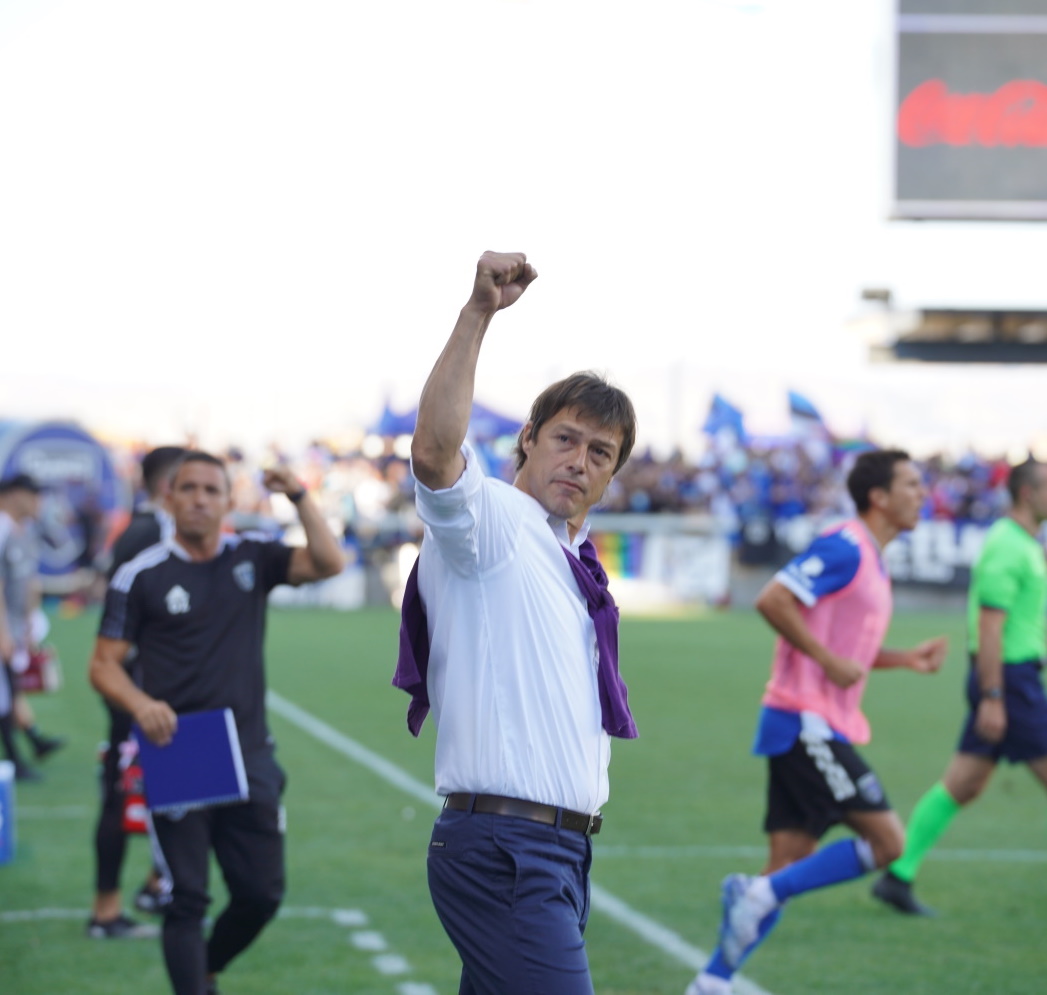Photo credit: ISI Photos / San Jose Earthquakes
Sam Stejskal’s recent article about the San Jose Earthquakes’ GM search starts with a provocative premise: no one around the league seems to know what the heck the team’s identity is, which is both an indictment of how things have gone since 2008 and a potentially attractive blank canvas with which to work for any prospective GMs, provided of course that they’re backed appropriately.
As a lifelong San Jose fan, as well as a long-time roster construction obsessive, it struck a chord for me. For all but any league’s richest clubs, that can compete and paper over mistakes simply by throwing money at problems, you need an identity, or what economics might refer to as a “comparative advantage,” to define a niche that allows you to compete.
We know that a major influx of spending is not coming under John Fisher. So it got me thinking: what are the potential comparative advantages that San Jose could leverage? What identities could it (authentically) adopt that might be able to make the project more coherent in the next decade than the previous one?
Here I propose a few for your (and the club’s) consideration, and how the club could go about manifesting them in reality:
Identity 1: Silicon Valley FC
Pro Sports Comparison: Oakland A’s, A poor-man’s Golden State Warriors
Who to hire as GM: Will Kuntz
Who to hire as coach: Someone who will defer to the numbers
If there’s any club in MLS that ought to be a natural fit for advanced analytics, “disruptive” thinking, and “lightyears ahead” approaches to a traditional old sport, it ought to be the one located in the heart of Silicon Valley. Modern approaches go beyond crunching game stats to identify talent and include things such as Sports Science which have become invaluable to the top clubs in the world, in all sports. The Oakland A’s famously pioneered Moneyball in the MLB, and the Golden State Warriors went from laughingstock to dynasty during Joe Lacob’s Silicon-Valley-style leadership.
Unfortunately, quite the opposite has been the case: the Quakes have mostly been a very old-school organization, particularly during John Doyle’s tenure. To this day, they have no full-time analytics staff. Jesse Fioranelli, while no doubt much more comfortable with modern analytics than any of his predecessors, had only mixed success creating a Moneyball of his own.
The solution, if this is the path they choose, is to identify the GM they think is brilliant enough to outcompete their peers in this sort of game, back them with investment in analytics staff and technology, then turn the keys over. The coach would be a secondary figure since roster composition and even lineups would be significantly guided by what the analytics said, as decided by the GM. A much fuller explanation of what this might look like can be found toward the end of Jamon Moore’s most recent article about the GM search.
There are several potential candidates who could fulfill this role. Will Kuntz, of LAFC, has been getting a lot of buzz in the Quakes GM search, and his role deep in the caverns of MLS’s salary rules, as well as prior experience within the Yankees organization, indicate the kind of mind who might be up to this sort of challenge.
This approach has been tried by certain places, such as AZ Alkmaar in the Netherlands and FC Midtjylland in Denmark, both of whom coincidentally consulted with Billy Beane. Brentford FC is also on the list of hyper-analytical front offices. The theme, of course, is smaller clubs with smaller budgets, which would fit what we are likely to see from ownership. Some might see this identity as a bit soulless, but fans tend to be forgiving if the approach is a winning one.
Identity 2: Rooted in Place
Pro Sports Comparison: Athletic Bilbao, Chivas, Pittsburgh Steelers
Who to hire GM: Chris Leitch
Who to hire as coach: Ian Russell
Some clubs bill themselves as something more than a club, most literally FC Barcelona. For the most part, these are clubs that are deeply rooted in their local neighborhood or region, and carry a sense of identity that goes well beyond the sport itself. FC Barcelona represents the Catalan nation. For Bilbao, it’s Basque Country, the exclusive source of their players. For Rayo Vallecano, it’s a particular Madrid neighborhood and its leftist inclinations. Unsurprisingly, then, they have identities that transcend the sport itself, and typically have political alignments too. American sports are less politicized, but there are numerous teams where the culture and identity of a region is fairly inseparable from the team’s on-field identity and fanbase, with the Pittsburgh Steelers serving as but one good example. In effect, this creates a relationship between fan and club that is more akin to “member” than “customer”.
San Jose, as a club, and the Bay Area, as a region, have a deep history of soccer to call upon, including 4 major trophies from 2001-2012. They also have an enviable tradition of local players, not just including literal academy products, but also players like Chris Wondolowski, John Doyle, and Ramiro Corrales who grew up in the area before spending most of their MLS careers with the club. It also has long had an ethos of loyalty and commitment, from the players but also the Ultras, that emphasizes values over “entertainment” or wins and losses. In this vision, rather than embrace the white-collar Silicon Valley identity, the Quakes would embrace the working-class Bay Area.
The way the club has been marketed has left some to be desired, not in the least because it frequently fairly narrowly focuses on San Jose at the exclusion of the broader Bay Area despite being the only MLS club for 400 miles. While it’s easier to form an identity when you’re serving a smaller, more specific region, and at a lower professional level, the Oakland Roots have done an excellent job at cultivating this sort of one, albeit seemingly caring more about the brand than the soccer itself at times, and would serve as an excellent starter template.
On the field, the philosophy would be relatively straightforward: value continuity in both the front office and the players. Invest deeply in the academy and build a team on their backs. Lean on the people and things that have characterized San Jose over the long run. That means promoting from within (with Leitch as GM and Russell as coach) and making sure to hang on to the loyal soldiers in the mold of Shea Salinas and Wondolowski whenever new ones arise. San Jose’s soccer scene traditionally has a blue-collar ethic of hard work, rather than necessarily technical brilliance, and that would persist in this vision.
Fans might appreciate the sense of community, but could the approach also be a winning one? The academy really could be good enough to sustain a strong team. The Quakes have Northern California entirely to themselves, and it’s a talent-rich region. In addition to the several strong homegrown players currently on roster, don’t forget the several locally born/raised players who got away (such as Sebastian Lletget, Isaac Brizuela, Lynden Gooch and Jonathan Gonzalez). However, allowing sentimentality and identity to guide team selection means you’re less likely to be able to take advantage of every market inefficiency, which could mean you’re a step behind competitively, and essentially guarantees you’ll never be a powerhouse. Then again, Chivas and Bilbao have been highly successful despite their self-imposed restrictions.
A certain kind of fan would love this identity, but it’s not for everyone.
Identity 3: Los Pelados
Pro Sports Comparison: Leeds United, Any Mike Leach College Football team
Who to hire as GM: Effectively, Almeyda, although perhaps hire someone like Leitch to help him navigate MLS roster rules.
Who to hire as coach: No one. You’d extend Almeyda.
For many clubs, their identity isn’t necessarily a permanent state of affairs, based on a particular place or value set. Instead, standout leaders, when they come along, set the entire organization’s identity on their own. This can be powerful, as we see in college basketball, for example, where the game is defined by coaches and their personalities.
For Leeds United, a once-proud club fallen from grace, they decided to turn the club’s destiny over to Marcelo Bielsa, who is equally known both as “Profe” and “El Loco.” His genius remains undisputed, but he’s a notorious eccentric with a thoroughly mixed record. At Leeds, he was given freer reign than he had known for possibly years, and the result has been not just a promotion and strong finish on their return to the Premier League, but a stirring brand of football that has given rebirth to the cult of Bielsa. It’s hard to overstate how much Leeds fans adore that man.
San Jose, of course, has the advantage of already having on their books a man who can single-handedly define the identity of a club. Matías Almeyda is an outsized personality who speaks about the game in practically religious terms, subscribes to the Bushido code, and has a very specific idea of what he wants his teams to do on the pitch. Best of all, his players largely seem to be fully bought-in to that vision. And it’s led to some immensely entertaining soccer over the last 3 years.
Of course, it’s also led to some truly pathetic displays too. If you’re buying into this vision, you believe that the reason Almeyda has yet to truly succeed is some combination of a lack of spending and a front office that wasn’t doing a good enough job getting Almeyda the players he needed. As such, while a major boost of spending appears unlikely, you would hope that a modest bump, combined with empowering him to essentially act as his own GM, would give him the right playing staff to compete at a higher level than we’ve seen in the last three years.
A man like Almeyda doesn’t come around every day to a club like San Jose. He’s popular, likable, and occasionally brilliant. If it’s working, he’ll keep fans engaged and in the seats on his own. If it’s not, or he decides to leave, well…you’re back to where you started.





I like option #2. It’s time for the Quakes to enter a new era.